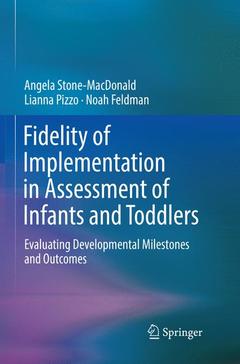Description
Fidelity of Implementation in Assessment of Infants and Toddlers, Softcover reprint of the original 1st ed. 2018
Evaluating Developmental Milestones and Outcomes
Authors: Stone-MacDonald Angela, Pizzo Lianna, Feldman Noah
Language: English
Subjects for Fidelity of Implementation in Assessment of Infants and...:
Keywords
Assessment and intervention of infants and toddlers; Assessments in early intervention settings; Battelle Developmental Inventory; Second Edition (BDI-2); Checklists and early childhood assessment; Cultural sensitivity and early assessment; Developmental assessment of infants and toddlers; Early intervention for infants and toddlers; Early intervention for developmental delays; Early intervention for young children with disabilities; Fidelity of implementation in assessment; Fidelity of implementation in
Approximative price 94.94 €
In Print (Delivery period: 15 days).
Add to cartPublication date: 01-2019
Support: Print on demand
Approximative price 94.94 €
In Print (Delivery period: 15 days).
Add to cartPublication date: 04-2018
Support: Print on demand
Description
/li>Contents
/li>Biography
/li>Comment
/li>
This book examines the challenges in developmental assessment of infants and toddlers and provides best practices for implementing standardized assessments in early intervention settings. It starts with an overview of standardized assessment practices and discusses how specific tools can be used in early intervention for different purposes (e.g., eligibility for services). The book explains the importance of the Fidelity of Implementation of Assessment (FOI-A) approach in creating standardized assessment for infants and toddlers. Chapters provide a checklist-based framework for FOI-A, with details on technological supports for test administration and data collection as well as training and supervision models. In addition, chapters discuss ways of engaging families, gaining their trust, and including them in their children?s educational planning.
Topics featured in this book include:
- The Battelle Development Inventory, 2nd Edition (BDI-2) and its use in the assessment of young children.
- Using checklists to improve fidelity of implementation for standardized assessments.
- Using checklists to support early intervention directors and teams.
- How to provide feedback to early interventionists and other professionals on FOI-A.
- Recommendations to improve FOI-A.
Fidelity of Implementation in Assessment of Infants and Toddlers is a must-have resource for researchers, clinicians and related professionals, and graduate students in varied fields including child and school psychology, pediatrics, social work, behavioral therapy, infant and early childhood development, and early education and care.
Angela Stone-MacDonald, Ph.D., is an Associate Professor at the University of Massachusetts Boston in the Early Education and Care in Inclusive Settings program and the Director of the PhD program in Early Childhood Education and Care (ECEC). She received her doctorate from Indiana University in Special Education and African Studies. Dr. Stone-MacDonald has worked with people with disabilities for the last two decades as a paraprofessional, teacher, consultant, and researcher. Her areas of research include early intervention, international special education for children with developmental disabilities, and teacher preparation for early intervention. Her current research agenda includes early intervention personnel preparation and inclusive early childhood education in Tanzania, Africa. She has received several grants to support her research from her university, the Massachusetts Department of Early Education and Care, and the U.S. Department of Education. Dr. Stone-MacDonald serves her field as well as children and families with disabilities at the local, state, and national levels on a variety of committees and projects.
Lianna Pizzo, Ph.D., is an Assistant Professor of Early Childhood Education and Care at the University of Massachusetts, Boston. She holds her doctorate in Curriculum and Instruction from Boston College as well as a Master’s in Developmental Psychology and Specialist in School Psychology from Gallaudet University. Dr. Pizzo has worked in the field of education and assessment for more than 15 years as a school psychologist, program evaluator, researcher, and teacher educator. Dr. Pizzo’s research has examined curriculum, instruction, and assessment for bilingual and multilingual learners, as well as culturally, linguistically, and developmentally appropriate assessment practices for young children. Her most recent work has been in language, literacy, and assessment of d/Deaf and hard of hearing Multilingual Learners (DML
Reviews best practices for standardized assessments in early intervention (EI) with infants and toddlers
Discusses issues of inequity in assessing young children from culturally and linguistically diverse backgrounds
Examines a case using the fidelity of assessment in early intervention using the Battelle Developmental InventoryTM, Second Edition (BDI-2)
Introduces checklists as a tool for self-reflection and monitoring
Highlights various infant and toddler EI assessments




